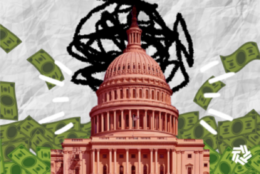Department of Homeland Security
-
Based on new figures, the military expects to spend more than three times what DHS is requesting for cyber operations.
March 25, 2011 -
The U.S Travel Association and a panel of travel and security experts have unveiled a plan to improve security at America\'s airports and reduce the burden on travelers. The association\'s Geoff Freeman gives us details.
March 22, 2011 -
The hack attack that breached tools provided by RSA has affected federal users, but the Homeland Security Department is advising agencies, they don\'t need to replace the product.
March 22, 2011 -
Immigrants and other job seekers in five states and the District of Columbia with questions about their eligibility to work in the United States can now use a government database to verify their own status. USCIS Director Alejandro Mayorkas explains how it all works.
March 22, 2011 -
By Ruben Gomez Federal News Radio Northrop Grumman has won a contract that could make it safer for your agency to share information. The project has a potential value of $1.1 billion. It’s a follow-on…
March 21, 2011 -
March 23rd, 2011 at 11 AM Criminal enterprises operating globally - so-called \"Transnational Criminal Organizations\" -- have spent years refining their approaches to all types of illicit trafficking including narcotics, weapons, illicitly gained and laundered money, and even modern day slavery. In many ways, these organizations can be considered multi-national corporations, given their size, reach, and sophistication. Indeed, their production and logistics operations rival best practices in the commercial sector, with highly resilient supply chains driven by the need to minimize the risk of seizure. TCOs often directly and indirectly enable, support, and facilitate insurgencies and terrorism; undermine state stability, security, and sovereignty; and corrupt legitimate global financial and trade networks. The stakes are high. U.S. Law Enforcement, Homeland Security, and the Department of Defense (DoD) find themselves at the front lines of this global security issue. As criminal organizations adapt to traditional interdiction methodologies, stakeholders across government are coming together to stem the tide, looking at what new technologies and whole of government approaches can be brought to bear to address this complex threat.
March 21, 2011 -
Despite a 2006 mandate to secure mobile devices and implement two-factor authentication, only just over half of federal agencies have managed to do so. OMB submits its annual FISMA report to Congress detailing the steps the government has taken to improve cybersecurity, including spending $12 billion on cybersecurity last year.
March 21, 2011 -
David Silverberg, editor of Homeland Security Today, has an update on the mission to Tokyo.
March 14, 2011 -
The Department of Homeland Security is accepting public comments until April 13 on how it can change, streamline or repeal regulations.
March 14, 2011 -
US-CERT is warning of potential emails scams requesting donations for the Japan earthquake and tsunami.
March 11, 2011 -
The Department of Homeland Security is offering a new program that invites top executive-level talent from the private sector to share their expertise with the Department to fill some exciting and important roles here at DHS.
March 11, 2011 -
New vice chairman of the CIO Council Richard Spires said he wants small and large agencies to learn from each other when it comes to implementing IT reforms. Small agencies have a different type of challenge than larger ones in implementing OMB\'s 25-point plan.
March 10, 2011 -
The Government Accountability Office sustained protests from two losing bidders under the Transformation and System Consolidation (TASC) program, say government and industry sources.
March 10, 2011 -
A Senate Democrat blasted the Obama administration for holding up passage of cybersecurity legislation that has been subjected to a more than year-long interagency review process.
March 10, 2011 -
Einstein 3 also expands information sharing by the US Computer Emergency Readiness Team, and allows automatic US-CERT alerts.
March 09, 2011




